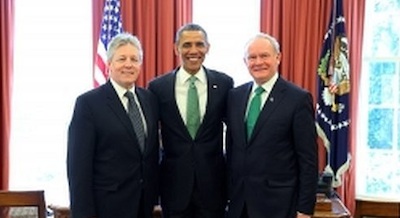
DUP leader Peter Robinson and Sinn Fein’s Martin McGuinness will join Irish officials travelling to Washington DC next month ahead of St Patrick’s Day, but a high-profile meeting with US President Barack Obama may not now take place.
Negotiations on flags, parades and the past in the run-up to St Patrick’s Day had been expected to revive ahead of the annual White House event, traditionally the climax of the Irish political calendar.
Irish-American US vice-president Joe Biden has been linked with efforts to resurrect the series of recommendations made by US mediators Richard Haass and Meghan O’Sullivan at the end of last year.
But the prospects of a breakthrough -- considered necessary for a top-level White House encounter -- is now being played down by the main political parties.
Negotiations on the contentious issues ended without agreement in the early hours of New Year’s Eve. The DUP and Ulster Unionists rejected the proposals, while Sinn Fein, the SDLP and Alliance have all called for their implementation.
There have been a handful of meetings between the five main party leaders in the weeks since the negotiations broke down. However, so far there has been little progress towards implementing any aspect of the Haass/O’Sullivan final draft.
The annual St Patrick’s Day bash at the White House, when the Irish Taoiseach of the day presents a bowl of shamrock to the US President, had been seen as a potential new deadline for agreement.
But multi-party talks at Stormont have stalled and recriminations have only intensified. It is feared that the local and European elections in May are now the major stumbling block in the negotiations.
“It is very hard to be convinced the DUP are serious about doing business as opposed to positioning themselves for election,” an SDLP spokesperson said.
Speaking earlier this month, Mr Haass said flags and symbols had proved to be the biggest issue for the parties as well as a “code of conduct” that would govern sectarian parades.
Describing the Six Counties as “one of the most segregated societies in the world”, Mr Haass insisted there had been “surprising progress” on how to deal with the past legacy of the conflict.
The US State Department envoy said that although the talks failed “you need to take a longer term view of these things”.
However, the situation on the ground in relation to parades and symbols has continued to deteriorate.
A call by cross-community Alliance representative Anna Lo for republican and loyalist murals to be removed along the route of the major stage bicycle race, the Giro d’Italia, saw her become the focus of a racist online tirade by loyalists opposed to the move.
Ms Lo, who was born in China, had appealed for a flag and mural-free race after other it was suggested that no election posters should be put up along the route of the Giro, which takes place between May 9 and 11.
Meanwhile, it has been confirmed that loyalists are now routinely refusing to identify themselves when notifying the Parades Commission of their intention to hold a parade.
By simply not signing the necessary forms, organisers of sectarian parades this summer are being enabled to avoid prosecution for any breaches of the law.
The Commission, which adjudicates on the terms and routes of parades in the North, inexplicably allowed almost 200 such parades to go ahead last year.
![[Irish Republican News]](https://republican-news.org/graphics/title_gifs/rn.gif)
![[Irish Republican News]](https://republican-news.org/graphics/title_gifs/harp.gif)

